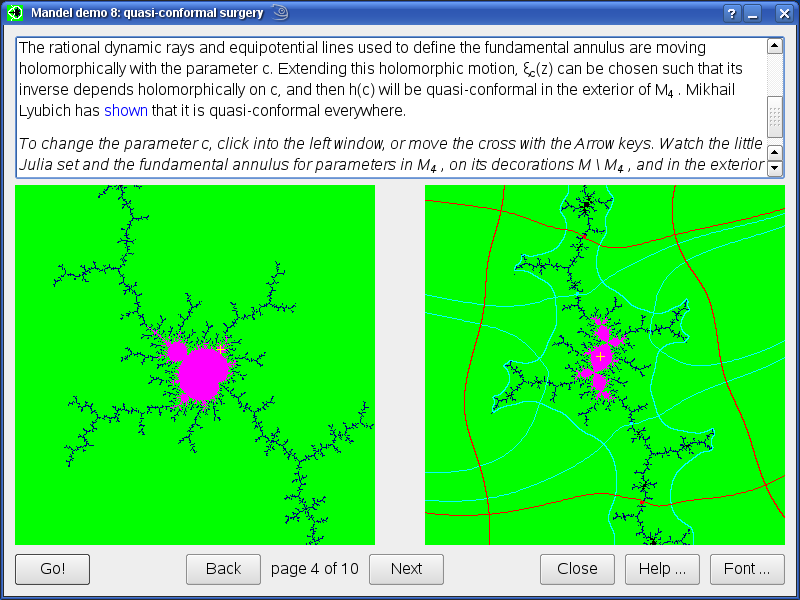
- MANDELBROT FRACTAL PROGRAM FOR MAC HOW TO
- MANDELBROT FRACTAL PROGRAM FOR MAC INSTALL
- MANDELBROT FRACTAL PROGRAM FOR MAC FULL
- MANDELBROT FRACTAL PROGRAM FOR MAC CODE
- MANDELBROT FRACTAL PROGRAM FOR MAC FREE
It gives you a respresentation of different sets, starting with Mandelbrot and you can zoom in to find interesting sections.
MANDELBROT FRACTAL PROGRAM FOR MAC INSTALL
At first I didn’t install it because I had no idea what that meant, but it’s pretty cool.
MANDELBROT FRACTAL PROGRAM FOR MAC FREE
Xaos is a free (under GNU licence) fractal zoomer. I don’t really know much about it, but I do know two more things than I did before.
MANDELBROT FRACTAL PROGRAM FOR MAC CODE
For some examples in python and mathematica, see my code golf challenge.While doing a bit of cruising through deviantART I decided that I wanted to try out some fractal art. Here's an example of a Pythagoras' Tree in postscript using macro-expansion and a very abbreviated set of turtle commands. For a bounded-recursion procedure set ( eg.), you embed the turtle commands in the procedures and either add recursion-level checks to each procedure or factor it out to a handler function. If using macro-expansion (as in the example below), you will still need a procedure set to map symbols to turtle commands and a procedure to iterate through the string or array to run the encoded turtle program. It can be implemented as a macro-expansion or a procedure set with extra controls to bound the recursion. L-systems are related to Post-systems and Semi-Thue systems, and like virii, they straddle the border of Turing Completeness. Then you need a layer to execute an L-system. But you don't have to go nearly that far to get some pretty pictures using the turtle concept.
MANDELBROT FRACTAL PROGRAM FOR MAC FULL
A full LOGO system is in fact a Lisp programming environment using an unparenthesized Cambridge Polish syntax. Search for "LOGO graphics" or "Turtle graphics". There are lots of fun shapes to be made with turtle graphics using turtle geometry even without an L-system driving it. Forward, Back, Left, Right, Pen-up, Pen-down. This requires a couple of layers interacting, but each is interesting in it own right.įirst you need a turtle. If complex numbers give you a headache, there is a broad range of fractals that can be formulated using an L-system.

The astounding fact about fractals is how we can obtain a tremendously complex set (in particular, the frontier of the Mandelbrot set) from easy and apparently innocuous requirements. If you want to have fun and produce pretty plots, draw it in different colors depending on the magnitude of abs(20th term).

You should indeed start with the Mandelbrot set, and understand what it really is.
MANDELBROT FRACTAL PROGRAM FOR MAC HOW TO
Screen.Plot(x,y, iterations % maxColors) //depending on the number of iterations, color a pixel.ġ.) Learn exactly what the Square of a Complex number is and how to calculate it.Ģ.) Figure out how to translate the (-2,2) rectangular region to screen coordinates. While(Complex.Abs(Z) < 2 & iterations < maxIterations) Int maxColors = 256 // Change as appropriate for your display. Int maxIterations = 10 // increasing this will give you a more detailed fractal public void MBrot()įloat epsilon = 0.0001 // The step size across the X and Y axis

When done, color the original pixel depending on the number of iterations you've done. If the distance from the origin is greater than 2, you're done. If you reach the Maximum number of iterations, you're done. = ^2 + while keeping track of two things:Ģ.) the distance of from the origin. So, start by scanning every point in that rectangular area.Įach point represents a Complex number (x + yi). The Mandelbrot-set lies in the Complex-grid completely within a circle with radius 2. My quick-n-dirty code is below (not guaranteed to be bug-free, but a good outline).


 0 kommentar(er)
0 kommentar(er)
